Occupy Central
Occupy Central is a civil disobedience movement which began in Hong Kong on September 28, 2014. It calls on thousands of protesters to block roads and paralyse Hong Kong's financial district if the Beijing and Hong Kong governments do not agree to implement universal suffrage for the chief executive election in 2017 and the Legislative Council elections in 2020 according to "international standards." The movement was initiated by Benny Tai Yiu-ting, an associate professor of law at the University of Hong Kong, in January 2013.
OCCUPY CENTRAL - DAY 37: Full coverage of the day’s events
Protesters build makeshift communities at Occupy sites
Protesters have built makeshift communities at scattered Occupy sites, with tent villages, a study hall for students and even a library
PUBLISHED : Monday, 03 November, 2014, 6:13am
Protesters' tents on Connaught Road Central in Admiralty. Photo: Sam Tsang
In the early days of the Occupy movement, elegantly dressed office ladies in Admiralty wishing to join protesters had a problem.
Unless someone was around to help, the 60cm barriers surrounding the occupied sites were a near-insurmountable obstacle for anyone wearing a tight skirt.
Not any more. In an example of the numerous ways the sites and the lives of people at them have evolved to meet needs, improvised staircases made from scrap wood now provide access at regular intervals.
The creator of the steps is retired garment-factory manager Chan Wing-fai. Chan gets up early almost every morning to salvage wood from a refuse station near his home in Lai King.
"I have never picked up trash before, nor did I think I would ever do it," the 68-year-old said in Admiralty on a recent afternoon, as he coached a group of young people on how to make chairs with discarded furniture.
"Originally I built the staircases with boxes of bottled water but they were not very durable," he said. "Then I decided to strengthen them with planks."
Across the three protest sites in Admiralty, Causeway Bay and Mong Kok, similar stories are being told in a movement that was planned as a three-day sit-in but has now passed the one-month mark.
On Harcourt Road, a "study hall" where class-boycotting students continue their education can now seat 200.
An elderly man named C. L. Chang was the carpenter for that project. Like Chan, he carried dumped boards from Wan Chai to Admiralty every day for a week, which were fashioned into chairs for students using the study room.
"As the study room became a new landmark in Admiralty, people - and even a restaurant - started sending tables and chairs to us. Furniture stores also sent us some sample cabinet boards of high quality."
Opposite the Admiralty Centre railway exit, freelance designer Pat is managing a newly established "Freedom Quarter" - two zones that together offer about 100 tents for protesters to stay overnight.
Pat barely knew other protesters before the police fired the 87 canisters of tear gas on September 28 that galvanised the protest. Someone invited her to take care of a booth a few nights after she began camping in Harcourt Road, and she ended up taking on the role of "tent manager".
To spend a night in the Freedom Quarter, protesters must line up at the booth at 8.30pm and read through a set of guidelines before checking in.
They are given star stickers for their tent, which they have to remove the next day to indicate they have left.
"I didn't have any experience and I just learned how to do it bit by bit," Pat said. "I guess it's just a rule of nature. People live in groups and it's natural that every one of them will pick up a different role and gradually build the community."
At the less-populated Causeway Bay site, a library corner offers protesters a choice of books donated by supporters.
Next to the library corner on Yee Woo Street is a white board that provides updates on the democracy movement - such as the latest stances of student leaders and officials - and a timetable for civic lectures.
"Everyone can write something on the board - there is no leader here," said an elderly man who refused to give his name.
The five-odd supply stations on Nathan Road in Mong Kok evolved independently, with the managers not knowing one another. Now they have created a group on WhatsApp that they use to keep in close communication.
"We will give the group a shout if we are running out of certain types of supplies, and see if anyone can pass us some," said Ping Lee, who runs a station opposite Shantung Street.
The stocks are donated by democracy supporters. Lee puts a list up next to his booth with updates about what is needed.
"People just drop the stuff and go," Lee said. "There was one time we received more than 20 boxes of bottled water just an hour after we put up a notice. People are very passionate."
The protest site in Mong Kok is also well-known for its pantheon of deities installed by protesters to guard the barricades, which includes Jesus, Buddha and war god Kwan Tai.
Student Tony Chan, part of a team that built the Kwan Tai shrine on Mong Kok Road, said it began with a picture of the deity, and evolved into a statue and then the present temple.
They eventually incorporated the temple into part of the defence line by using bamboo and wooden frames from construction sites.
Mirana May Szeto, an assistant professor in the University of Hong Kong's department of comparative literature, said the protesters had demonstrated that they treasured the community they had developed.
"We have very small homes and we value the sharing of space," she said.
"People actually want to stay as long as possible to ensure the sense of community and livelihood."
As the movement passed its first month, protesters understood that the community they had built would inevitably be demolished, but hoped the spirit could remain.
"Hongkongers used to be quite cool to each other, never saying hello to our neighbours and not even knowing their surnames after 20 years," Chan the staircase man said. "Perhaps this movement could make a change in everyone."
Additional reporting by Chris Lau
Former Beijing democracy movement leader Zhou Fengsuo backs Occupy
Zhou Fengsuo, a former student leader of Beijing's democracy movement in 1989, has flown in from the US to offer his support to Occupy protesters.
"Twenty-five years ago ... the first Hongkonger I knew told me that he saw hope for China in Tiananmen Square. And today, your presence here represent the hopes of China's future democracy," Zhou told the crowd in Admiralty last night.
"We failed to implement democracy in China 25 years ago, and now we need the young people of Hong Kong to stand up for their rights."
Zhou, who had been No5 on Beijing's wanted list during the Tiananmen movement, said he had decided to join Hong Kong's "umbrella movement" after seeing images of police using tear gas to disperse protesters on September 28.
He said the Occupy protest resembled the situation in Beijing in 1989, with young people fighting - and sacrificing - to make their dreams of democracy come true.
But he believed the protest would not suffer the same bloody ending as Hong Kong enjoyed the rule of law, press freedom and a modern social media system that allows for swift information flow.
He refused to offer advice to the student leaders, who he said had a better understanding of the situation, but he encouraged Hongkongers to use their creativity to press the movement forward.
Zhou, who will stay in Hong Kong for a week, said he would camp overnight with protesters in Admiralty. He also plans to visit the June 4 memorial museum in Tsim Sha Tsui.
Like many Beijing student activists, Zhou fled to US and lived in exile after the June 4 crackdown.
An earlier version of this story said former Tiananmen student leader Zhou Fengsuo fled to the US after the June 4, 1989 crackdown "with no prospect of returning to his motherland." Zhou managed to slip back into Beijing in June 2014 before he was detained, interrogated and put on a plane back to the US.
This article appeared in the South China Morning Post print edition as Neighbourhood spirit
PUBLISHED : Monday, 03 November, 2014, 6:13am
UPDATED : Monday, 03 November, 2014, 6:13am
Business as usual in Hong Kong? No one's buying it
Trade delegation tells Europeans 'everything is fine' but the Occupy protests remain a concern
Occupy protests prove a niggling concern for European investors
The "umbrella movement" has put Hong Kong in the global spotlight. In Europe last week, a curious Parisian taxi driver asked me what was going on in the city.
It's a good question. Sure, life goes on after more than a month of protests against Beijing's hardline stance on the 2017 chief executive election. But it certainly isn't business as usual - or at least it wasn't for the annual Trade Development Council delegation to Europe. The campaign, Think Asia, Think Hong Kong, aimed to sell the city as the gateway to the huge mainland Chinese market for businesspeople in Europe and, in particular, France.
More than 150 representatives from the finance, technology and professional services sectors as well as government agencies were trying to convince over 1,000 French companies that the city was the place to invest.
However, the absence of Chief Executive Leung Chun-ying undermined the "everything is fine" message. Leung was supposed to head the delegation, but with no end in sight to the sit-ins, he sent Financial Secretary John Tsang Chun-wah and gave up a long-planned meeting with Italy's president. The meeting with a head of state was seen as a chance for Leung to broaden his international exposure.
It must have been a blow for Leung, but he can rest assured that everyone was still talking about Hong Kong. Tsang did his bit, reiterating that the government remained confident in its handling of the impasse - and that the city was still an ideal place to do business.
Some saw this as Tsang trying to head off embarrassing questions on the subject, which would have distracted from the sales task: Hong Kong, with its low taxes, is ready and waiting for European investors.
This message was directed especially at winemakers in France, with the selling point being that there is no tax on wine in Hong Kong - it was scrapped by Tsang in 2008.
But the protests proved a niggling concern. Some of the Europeans raised the delayed Hong Kong-Shanghai direct share trading scheme. Chow Chung-kong, chairman of Hong Kong Exchanges and Clearing, tried to reassure them that all was in order and it just needed approval from Beijing.
The mainland factor is a double-edged sword for Hong Kong. Its fast growth means huge opportunities - indeed TDC chairman Jack So Chak-kwong has built partnerships with mainland companies to promote Hong Kong - but it also relies on Beijing's blessing.
Foreign investors won't choose Hong Kong just because officials paint a rosy picture. They want to see social and political stability, a good business environment, and smooth relations with Beijing.
All of this is being tested by the protests - and it could ultimately push Beijing to get tough in other areas, not just democracy.
This article appeared in the South China Morning Post print edition as Business as usual in Hong Kong? No one's buying it
More Occupy Central protesters claim to have been beaten by police
PUBLISHED : Monday, 03 November, 2014, 6:13am
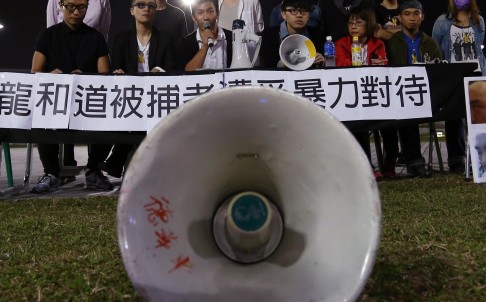
The group of 13 protesters includes teachers, social workers, performers and students. Photo: Jonathan Wong
More Occupy Central protesters last night claimed they had experienced violence at the hands of police when they were arrested in Admiralty last month.
About a dozen protesters said they had been "bashed" by officers trying to clear Lung Wo Road on October 15. The arrests happened on the same night that television cameras recorded a group of officers apparently kicking and punching Civic Party activist Ken Tsang Kin-chiu after his arrest.
One of the arrested protesters, Issac Tong Pun-yuen, said they had been punched, kicked, pulled by the hair and hit on the head by a group of between three and five officers.
"We are trying very hard to locate video clips from social media, yet all we could find were bits and pieces," he said. "The police deliberately dragged us to a place where the press was unable to see before they beat us up."
The group includes teachers, social workers and performers as well as students.
Tong said Tsang's case - over which seven officers have been suspended pending investigations - was the tip of the iceberg.
The protesters said they planned to seek legal advice.
They said they had contacted 28 of the 45 people arrested that night, when police used pepper spray to clear the road. Thirteen of these said they had suffered violence, of whom 10 said they required hospital treatment.
Several of those arrested said they had been resting in Tamar Park and were not involved in attempts to block Lung Wo Road.
Ken Pang said he was arrested while telling students to retreat. He said officers grabbed him from behind and punched him in the chest.
Another punched him in the face and twisted his hand, and he was kicked as he fell to the ground, he said.
"I repeatedly told them I was leaving the site, but they went ahead anyway," said Pang. He said police never told him he was arrested and did not read him his rights before putting him in the police vehicle.
A police spokesman said the force had an established mechanism to deal with complaints and would look into each complaint in a fair and impartial manner.
As of yesterday, some 1,324 complaints had been received in connection with the protests.
Additional reporting by Ng Kang-chung
This article appeared in the South China Morning Post print edition as More protesters claim they were beaten by police
Executive councillor Anna Wu snubs petition opposing Occupy Central
Anna Wu says she will not sign anything for or against a political issue
PUBLISHED : Monday, 03 November, 2014, 6:13am
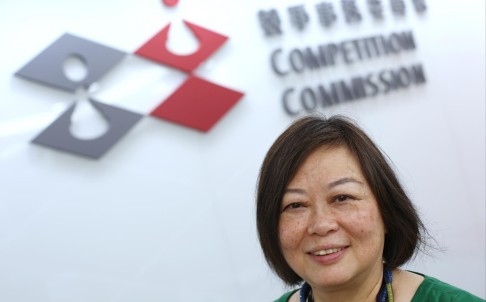
Anna Wu: moderate
An executive councillor known for her liberal views has broken ranks with most members of the government's policymaking body by choosing not to sign a petition backing the police and calling for an end to Occupy Central protests.
 Anna Wu Hung-yuk (胡紅玉), chairwoman of the Competition Commission and Mandatory Provident Fund Schemes Authority, has now snubbed two petitions by the Alliance for Peace and Democracy, the first launched in July and the second in October.
Anna Wu Hung-yuk (胡紅玉), chairwoman of the Competition Commission and Mandatory Provident Fund Schemes Authority, has now snubbed two petitions by the Alliance for Peace and Democracy, the first launched in July and the second in October.
At the time of the first one Wu said that she would not sign any petition that dealt with political positions. "My position has not changed, and as stated the last time I do not sign any petition for or against any particular position with matters of this type," Wu said.
Wu, a solicitor, urged students at the helm of the pro-democracy protests to consider forming a political party to groom leaders and take part in public policymaking.
Executive Council convenor Lam Woon-kwong, who also chose not to sign the first petition, did not respond to inquiries regarding the second.
Wu and Lam are among the 14 non-official members of Exco, which assists the chief executive in policymaking. The other 12 non-official members all signed the second petition despite concerns the campaign is adding to political polarisation in the city. Twelve of the 16 official Exco members had signed the first.
Both Wu and Lam are known as moderate voices in Chief Executive Leung Chun-ying's cabinet.
The most recent petition, which the Alliance started on October 25, seeks to "support our police", "free our roads" and "restore law and order", all with the goal of ending the pro-democracy sit-ins, which have paralysed parts of the city for five weeks.
The alliance said its latest effort had collected more than 1.5 million signatures by Saturday. The campaign ended yesterday.
Executive councillor Fanny Law Fan Chiu-fun said she had signed. "For over a month, we have seen enormous social disruption and economic damage to Hong Kong, and I wish to see an end to the Occupy Movement in a peaceful manner," she said.
A government spokesman said on September 26 that all political appointees, except Secretary for Justice Rimsky Yuen Kwok-keung, would sign the original petition online. Yuen would not, so as to stay neutral.
Executive councillor Cheung Chi-kong said the chief executive did not call on non-official Exco members to sign.
In 2012, Wu played a key role in defusing the crisis sparked by a government plan for the compulsory introduction of a national education curriculum in primary and secondary schools.
The curriculum was criticised as being an attempt to brainwash pupils.
The Committee on the Implementation of Moral and National Education, chaired by Wu, recommended in October 2012 that the curriculum be shelved.
While vowing to keep an open mind, Wu had some advice for student leaders.
"At this point, I hope the students will consider forming a political party as many students have a vote. They can groom leaders or be king-makers and actively participate in public policy making," she said. "Political reform and participation in politics is for the long haul."
She said that just 47 per cent of those aged 18 to 20 were registered voters. "Students aged 18 and above should register as voters," she said.
This article appeared in the South China Morning Post print edition as Exco member snubs anti-Occupy petition
Lawyers say Occupy protests are undermining Hong Kong's rule of law
PUBLISHED : Monday, 03 November, 2014, 3:38pm
Lawyers stand in silence outside the High Court to condemn Occupy protesters ignoring several court injunctions. Photo: Sam Tsang
About 50 lawyers held a silent gathering outside the High Court yesterday to express their concern that the rule of law has been undermined by protesters occupying roads.
 In a statement, the lawyers said: "Occupy Central disrupts and endangers the lives of Hong Kong people, causing immeasurable damage and inconvenience to literally all segments of the public."
In a statement, the lawyers said: "Occupy Central disrupts and endangers the lives of Hong Kong people, causing immeasurable damage and inconvenience to literally all segments of the public."
They asked the government to strictly enforce the law without delay and urged occupiers to leave protest sites immediately.
This came as the Alliance for Peace and Democracy, an anti-Occupy alliance led by Robert Chow Yung, announced it had collected 1.83 million signatures in a campaign that calls for the restoration of public order and supports the police.
Chow said the signatures, accounting for a quarter of the city's population, gave them legitimacy and he would request meetings with student leaders and pan-democrat lawmakers to urge them to stop the action.
The silent gathering was initiated by solicitor Stanley Chan Wing-leung of Sun Lawyers and Doreen Kong Yuk-foon of Reed Smith Richards Butler.
Also present was barrister and lawmaker Dr Priscilla Leung Mei-fun and barrister Ma Yan-kwok, of the pro-Beijing Democratic Alliance for the Betterment and Progress of Hong Kong.
There were 1,230 practising barristers and 7,893 certified solicitors in Hong Kong in April this year, according to the Law Society.
Chan said that it was urgent for legal professionals to safeguard the rule of law because injunctions issued by the court to clear portions of roads in Mong Kok and Admiralty had been flouted by protesters.
The High Court has granted three temporary injunctions against protesters in Mong Kok and around Citic Tower near the government complex in Admiralty. The orders have largely been ignored by the protesters.
Chan said the street protests should end for the sake of Hongkongers' well-being.
In June some 1,800 lawyers staged a silent march through the city to protest against Beijing's white paper on Hong Kong, saying it jeopardised judicial independence. The document, issued by the State Council on June 10, called judges "administrators" and said they should be patriotic.
This article appeared in the South China Morning Post print edition as Lawyers urge protesters to leave occupied sites
Amid stress of Occupy protests, Hong Kong's youth need better support
Sky Siu says recent surveys draw attention to the stress and emotional distress that Hong Kong youth face, not least because of Occupy protests
PUBLISHED : Monday, 03 November, 2014, 5:06pm
The youth-led Occupy protests have resulted in significant emotional distress among young people. Photo: May Tse
According to the United Nations, each year, 20 per cent of the world's youth population experiences a mental health condition. With 1.2 billion young people aged 15 to 24 worldwide, that means some 240 million are experiencing conditions such as anxiety, depression, bipolar disorder and schizophrenia.
In Hong Kong, in the past year, the media and research have highlighted alarming facts about mental health among the younger generation. A regional poll by Junior Chamber International found that Hong Kong people under 40 were the third most unhappy in Asia among the 10 places surveyed. A Hong Kong Economic Times article recently reported an increase in psychosis as a result of the high stress brought about by the month-long Occupy protests.
The youth-led protests have resulted in significant emotional distress among young people. All have been affected, directly or indirectly. Some friendships and family relationships have been tested as a result of differing viewpoints and perspectives; this tension has gone beyond school support systems and into cyberspace.
Such emotional distress creates tremendous demand for more psycho-social and emotional support, and is indicative of a generation of young people who may not be equipped with the necessary skills and resources to cope with highly stressful situations. It also reveals gaps which must be addressed to nurture a healthy and robust generation of future leaders and citizens.
Neglecting emotional and psychological needs could lead to further personal and emotional crises and an even wider social divide. Daunting situations, especially involving family, relationship and academic stress, are the top reasons for youth suicide in Hong Kong.
Mental health services are by no means lacking in this city but holistic and long-term help is often not given priority by the government and providers, especially when it comes to young people.
KELY Support Group was founded more than 20 years ago based on a simple communication channel: a telephone hotline service for youth, established in one person's living room. It adopted a unique peer-support approach, to help young people reach their potential. Youth mental health has always been an integral part of our work.
As youth services practitioners, we need to engage with and understand our young people, to best support their development. We must seek to be accessible and relevant, and include all young people in Hong Kong, including local Chinese, ethnic minorities and non-Chinese-speaking communities. As a society, we need to strengthen our relationship with young people and create more opportunities for dialogue, meeting their psycho-social and emotional needs through youth-friendly methods.
Now, more than ever, Hong Kong's young people need our support to make informed choices. We must continue to look for ways to enhance the existing social infrastructure to support young people, both physically and emotionally.
We need to speak to them on their level, to relate to them and be available to prevent any from falling through the gaps. This is our investment in Hong Kong's future.
Sky Siu is acting executive director of KELY Support Group
This article appeared in the South China Morning Post print edition as On the edge
Tiananmen student leader sees hope for Hong Kong during emotional visit to Occupy protests
A former leader of the Tiananmen Square protest 25 years ago says Occupy site feels familiar, but that the ending will be far different
PUBLISHED : Monday, 03 November, 2014, 6:48pm
Zhou Fengsuo at "Umbrella Square" in Admiralty on Monday. Photo: K.Y. Cheng
Zhou Fengsuo had hardly taken his first step among the tents and banners of Harcourt Road before the tears began.
The peaceful, determined occupation of the roads outside government headquarters brought to mind the 1989 pro-democracy movement on the mainland, of which Zhou was one of the leaders.
“[The scenes] are completely new [to me], but it’s also so familiar with what [happened] 25 years ago,” he said in an interview with the South China Morning Post on Monday morning.
“The fact that today’s China is still a totalitarian regime with no political freedom has made me very angry and sad,” he said. “But I am also very hopeful [to] see that this generation can stand up and take their future in their own hands... it’s very encouraging.”
The 1989 movement ended in failure amid a bloody crackdown in Tiananmen Square that cast a long shadow over China’s rise in the decades that followed. Zhou ranked fifth on Beijing’s most-wanted list at the time.
Watch: Former Tiananmen student leader: I see the future of China's democracy in Hong Kong
He arrived in Hong Kong from the United States on Sunday, and headed straight to Admiralty where he camped overnight.
The protest camps there and in Causeway Bay and Mong Kok are now in their sixth week, with little sign that the central government will agree to the protesters’ demand for an open election of the next chief executive.
Zhou said the movement was already a great success because of the scale of participation and the generally peaceful nature of the protests. But he said the protesters should come up with a “mechanism” to enable an end to the occupation.
Such a mechanism could strengthen the movement, he said, forging consensus among the diverse array of opinions about what should happen next.
Two months in and some protesters say they answer to neither the student or Occupy Central leaders, never mind pan-democratic lawmakers.
Zhou said the situation shared similarities with the Beijing movement in 1989.
“I was never named as a leader until I was on the most-wanted list,” he said. The overwhelming majority 25 years ago were following their own convictions more than any leaders – much like the current situation in Hong Kong.
While he admires the self-sustained and diverse communities that protesters have built in the occupied sites, Zhou warned that if protesters act “purely spontaneously”, they might lose control of the outcome.
Zhou agreed that it was common for there to be radicals and moderates in large-scale social movements, but hopes that the protesters will have the wisdom to embrace those differences.
In 1989, Zhou opposed protesters going on hunger strikes to pressure the central government. Standing amid the artwork and makeshift homes of the Admiralty camp, he said he could appreciate more what compelled the hunger strikers, as the government refused to offer concessions.
“In political issues, [protesters] need to be flexible and sometimes pragmatic while being idealistic in their end goal,” he said.
After the June 4 crackdown, the pursuit of real democracy became a rare topic of public discussion on the mainland.
Zhou said people there had been through a “painful experience”, forced under duress to reject the Tiananmen protest. He believes that history will not repeat itself in Hong Kong.
“Society [in Hong Kong] has more resources to keep the memory and ideals [of the protests] alive,” he said, adding that the new generation of protesters had also grown up with many different political and cultural influences.
Zhou is most impressed by young Hongkongers, particularly Joshua Wong Chi-fung of Scholarism. He has followed Wong on Twitter for three years, he said.
“The student leaders are way more mature than we were back 25 years ago,” Zhou said.
“[President Xi Jinping and the Hong Kong government] are making a big mistake by drawing a hard line without any reasonableness. They risk making an enemy of this whole generation,” he said.
These young people will eventually “seize their future” in 20 or 30 years time, said Zhou, when Hong Kong will pave the way to Chinese democracy.
This article appeared in the South China Morning Post print edition as Echoes of '89 in Admiralty
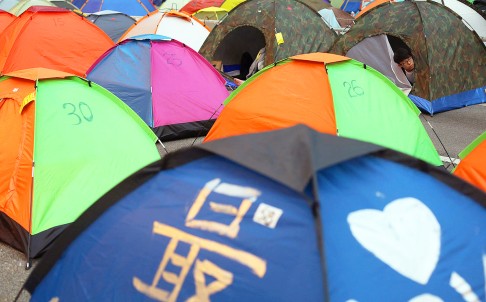
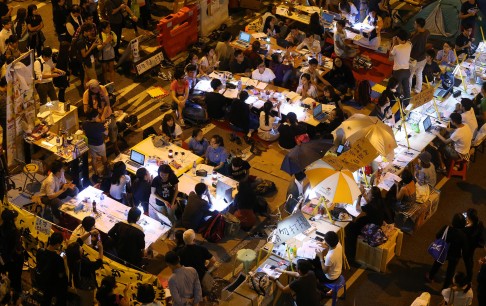
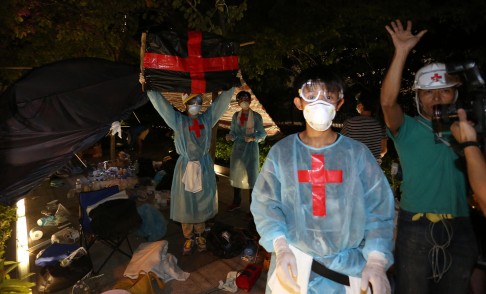
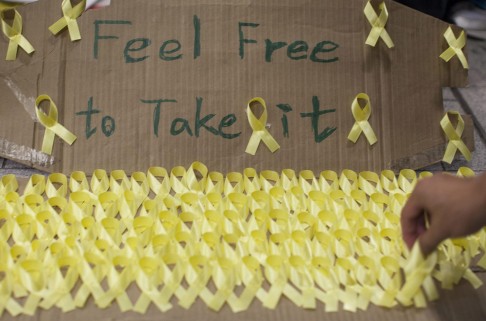
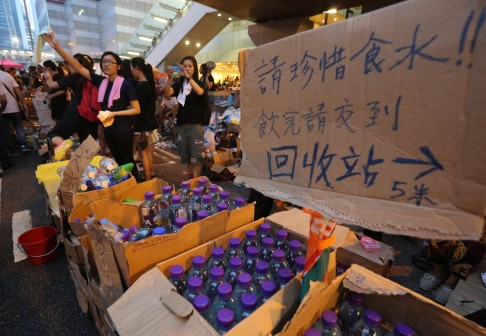
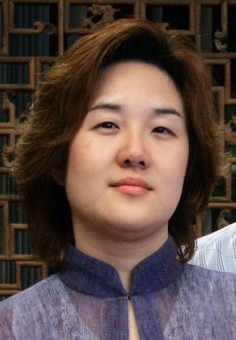

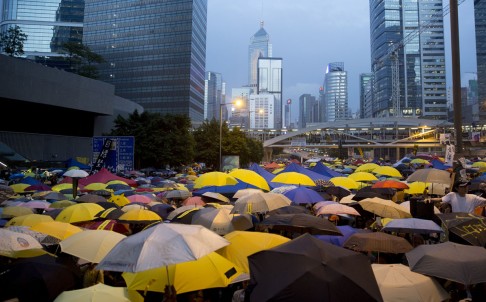
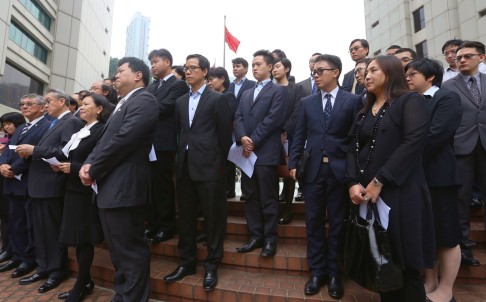
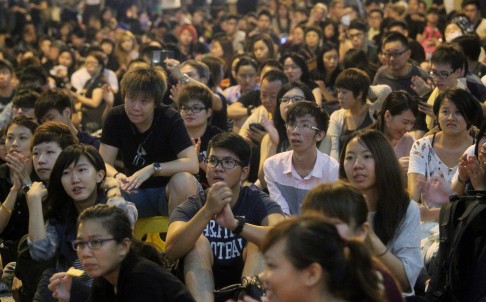
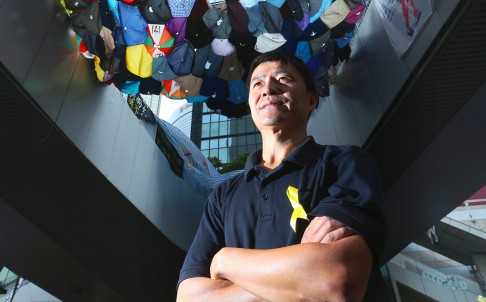
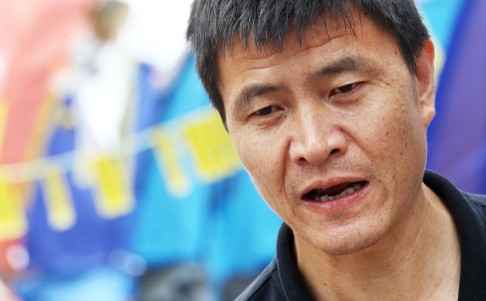
沒有留言:
張貼留言